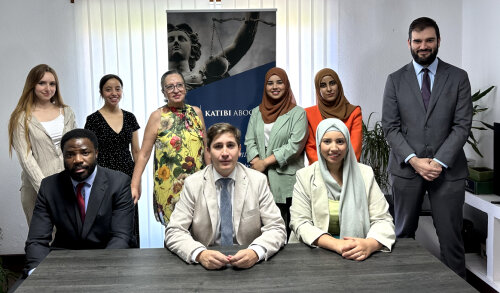Best ADR Mediation & Arbitration Lawyers in Cáceres
Share your needs with us, get contacted by law firms.
Free. Takes 2 min.
List of the best lawyers in Cáceres, Spain
About ADR Mediation & Arbitration Law in Cáceres, Spain
Alternative Dispute Resolution (ADR) covers a range of methods designed to resolve disputes without going to court, with mediation and arbitration being the two most common. In Cáceres, Spain, ADR is encouraged to reduce court congestion and provide more efficient, flexible, and confidential dispute resolution options. Mediation is a process where an impartial third party assists the disputing parties in reaching their own agreement, while arbitration involves a neutral arbitrator who hears arguments and evidence from the parties and issues a binding decision. Both processes are recognized and regulated under Spanish national law, with some specific local characteristics and resources for residents of Cáceres.
Why You May Need a Lawyer
There are several reasons why individuals or businesses in Cáceres might seek legal help for ADR mediation and arbitration:
- You are involved in a civil or commercial dispute and want to avoid lengthy court proceedings.
- You require guidance on whether mediation or arbitration is the right route for your case.
- You need help understanding the legal effects and enforceability of mediation agreements or arbitration awards.
- You wish to ensure that the chosen mediator or arbitrator is qualified and impartial.
- You are facing a cross-border dispute with international aspects.
- You want professional representation during mediation or arbitration to maximize your interests.
- You seek to enforce or challenge an arbitration award in court.
Legal advice can clarify your rights, suggest the optimal ADR method, prepare effective documentation, and safeguard your interests throughout the ADR process.
Local Laws Overview
Spain has specific laws governing mediation and arbitration, with local application in Cáceres. The key legislations include Law 5/2012 on Mediation in Civil and Commercial Matters and the Arbitration Act 60/2003. These laws outline the conditions, processes, and effects of mediation and arbitration. Cáceres also benefits from regional mediation and arbitration centers registered with the Ministry of Justice that help maintain standards and offer resources for disputants. Local lawyers are familiar with the particular ways in which these national laws are applied in Cáceres, ensuring that residents and businesses get context-appropriate advice and representation.
In most civil and commercial disputes, parties are encouraged to attempt mediation before taking matters to court. Arbitration can be voluntary or mandatory if contractually agreed-upon, and arbitration awards are recognized by Spanish courts, making enforcement relatively straightforward. Confidentiality, voluntariness, and impartiality are key principles embedded in both mediation and arbitration in Spain.
Frequently Asked Questions
What is the difference between mediation and arbitration?
Mediation involves a neutral facilitator who helps the parties negotiate a mutually acceptable solution, but the outcome is not binding unless agreed upon. Arbitration is more formal, where the arbitrator listens to both sides and issues a binding decision.
Are ADR methods legally recognized in Cáceres?
Yes, both mediation and arbitration are fully recognized under Spanish law and are commonly used in Cáceres for civil, commercial, and even some family disputes.
Can I be required to use ADR before going to court?
In some cases, especially when a contract includes an ADR clause, you may be required to attempt mediation or arbitration before initiating legal proceedings. In other instances, ADR is voluntary but strongly encouraged by the courts.
How do I find a qualified mediator or arbitrator in Cáceres?
You can consult registered regional mediation and arbitration centers or seek recommendations from local lawyers experienced in ADR.
Is participation in mediation or arbitration confidential?
Yes, confidentiality is a fundamental principle in both mediation and arbitration. Details discussed during the process cannot typically be used in later court proceedings.
What types of disputes are commonly resolved through ADR?
Civil and commercial disputes, tenancy issues, family disputes, labor conflicts, and consumer contracts are often resolved via ADR in Cáceres.
How long does mediation or arbitration usually take?
Mediation can sometimes resolve disputes in a single session, while arbitration may take several weeks or months depending on the complexity. Both processes are generally faster than court litigation.
Do I need a lawyer for mediation or arbitration?
While not required, having a lawyer can help you understand your rights, draft or review agreements, and represent your interests effectively.
Is an arbitration decision enforceable in court?
Yes, arbitration awards are generally enforceable in Spanish courts, including Cáceres, provided the necessary legal requirements are met.
How much does ADR cost?
Costs vary depending on the complexity of the case, the experience of the mediator or arbitrator, and the duration of the process. However, ADR is typically less expensive than pursuing traditional court litigation.
Additional Resources
For those seeking further assistance or information in Cáceres, the following resources can be valuable:
- Regional Mediation and Arbitration Centers - Register of Mediators and Institutions by the Ministry of Justice
- Ilustre Colegio de Abogados de Cáceres (Cáceres Bar Association) - for lawyer referrals and legal guidance
- Juzgados de Primera Instancia de Cáceres (First Instance Courts of Cáceres) - for court-related queries and enforcement of ADR results
- Cáceres Municipal Mediation Services - for community and family dispute mediation
These organizations and bodies can guide you through the ADR process and connect you with qualified professionals in the region.
Next Steps
If you are considering or are involved in a dispute in Cáceres and wish to explore ADR options, start by seeking independent legal advice from a local lawyer or through the Cáceres Bar Association. Discuss your situation to see whether mediation or arbitration is suitable for your case. Collect relevant documents, contracts, and any correspondence related to your dispute. If you proceed with ADR, ensure you understand your rights and obligations throughout the process. Professional legal assistance can ensure your interests are well protected and help to facilitate a more amicable and efficient resolution.
Should your dispute require formal mediation or arbitration, your lawyer can help you select an appropriate practitioner and represent you during sessions. After reaching an agreement or receiving an arbitration award, your lawyer can also assist in drafting enforceable documents or, if necessary, initiating proceedings for enforcement or appeals within the local courts.
Lawzana helps you find the best lawyers and law firms in Cáceres through a curated and pre-screened list of qualified legal professionals. Our platform offers rankings and detailed profiles of attorneys and law firms, allowing you to compare based on practice areas, including ADR Mediation & Arbitration , experience, and client feedback.
Each profile includes a description of the firm's areas of practice, client reviews, team members and partners, year of establishment, spoken languages, office locations, contact information, social media presence, and any published articles or resources. Most firms on our platform speak English and are experienced in both local and international legal matters.
Get a quote from top-rated law firms in Cáceres, Spain — quickly, securely, and without unnecessary hassle.
Disclaimer:
The information provided on this page is for general informational purposes only and does not constitute legal advice. While we strive to ensure the accuracy and relevance of the content, legal information may change over time, and interpretations of the law can vary. You should always consult with a qualified legal professional for advice specific to your situation.
We disclaim all liability for actions taken or not taken based on the content of this page. If you believe any information is incorrect or outdated, please contact us, and we will review and update it where appropriate.











